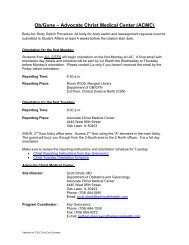Procedural Skills Instruction Arterial Blood Gas (ABG) Checklist
Procedural Skills Instruction Arterial Blood Gas (ABG) Checklist
Procedural Skills Instruction Arterial Blood Gas (ABG) Checklist
Create successful ePaper yourself
Turn your PDF publications into a flip-book with our unique Google optimized e-Paper software.
<strong>Procedural</strong> <strong>Skills</strong> <strong>Instruction</strong><br />
<strong>Arterial</strong> <strong>Blood</strong> <strong>Gas</strong> (<strong>ABG</strong>) <strong>Checklist</strong><br />
Please rate the examinee on the following items:<br />
1. Clean hands. ___Done __Not Done<br />
2. Check that all necessary equipment is available and ready to use. ___Done __Not Done<br />
3. Put on examination gloves. ___Done __Not Done<br />
4. Identified location of radial artery (palpated pulse lateral to flexor<br />
carpi radialis tendon. Thumb may not be used in palpation)<br />
Describe and demonstrate the steps in the Allen Test<br />
5. Hold patient’s hand up and have patient clench and unclench hand<br />
several times to drain blood from the hand.<br />
6. Compress the radial and ulnar arteries while patient is clenching<br />
the hand.<br />
7. Lower hand and have patient relax the arm and hand to alleviate<br />
tension which can cause inaccurate results. (Must verbalize)<br />
8. Release pressure on the ulnar artery and observe for brisk return of<br />
color to hand. (Must verbalize)<br />
9. “Describe potential results” - Participant answer need not be<br />
verbatim but must be complete: “Positive Test: Color returns to<br />
hand in 14 seconds or less and procedure can be done;<br />
Negative Test: Color returns to hand in 15 seconds or greater<br />
and procedure must be aborted. Assess the other hand.”<br />
10. Prepared area with alcohol wipe to simulate CHG (chlorhexidine<br />
gluconate) or idophor. Must state that solution stays on site for 2<br />
minutes until dry before puncturing the skin.<br />
11. Palpated artery with index finger of non-dominant hand proximal<br />
to (“above”) planned puncture site<br />
12. Using a Heparinized syringe, removed residual air from syringe.<br />
For credit, cap must be removed.<br />
13. Slightly adduct arm and dorsiflex the wrist approximately 30 o.<br />
Inserted needle at a 60° angle to the skin and advanced to the artery<br />
with bevel side up. (This must be done proximal to model) *You<br />
may Prompt participant to verbalize proper positioning.<br />
__Correct<br />
Technique<br />
__Correct<br />
Technique<br />
__Correct<br />
Technique<br />
__Correct<br />
Technique<br />
__Correct<br />
Technique<br />
__Correctl<br />
y<br />
Described<br />
__Correct<br />
Technique<br />
__Correct<br />
Technique<br />
__Correct<br />
Technique<br />
__Correct<br />
Technique<br />
__Incorrect<br />
Technique<br />
__Incorrect<br />
Technique<br />
__Incorrect<br />
Technique<br />
__Incorrect<br />
Technique<br />
__Incorrect<br />
Technique<br />
__Incorrectly<br />
Described<br />
__Incorrect<br />
Technique<br />
__Incorrect<br />
Technique<br />
__Incorrect<br />
Technique<br />
__Incorrect<br />
Technique<br />
<strong>ABG</strong> 3/20/2012<br />
__Not Done<br />
__Not Done<br />
__Not Done<br />
__Not Done<br />
__Not Done<br />
__Not Done<br />
__Not Done<br />
__Not Done<br />
__Not Done<br />
__Not Done
14. Assessed for flashback of blood into the syringe, then allowed<br />
syringe to fill. (about 1 cc - assessor should tell examinee that a<br />
smaller amount is sufficient for the purpose of the exam. Assessor<br />
may prompt for aspiration.)<br />
15. Placed 2x2 gauze pad over puncture site and withdrew needle and<br />
syringe. Needle safety device is engaged.<br />
16. Slowly inverts the syringe 10 times, and then roll between palms to<br />
mix.<br />
__Correct<br />
Technique<br />
__Correct<br />
Technique<br />
__Correct<br />
Technique<br />
__Incorrect<br />
Technique<br />
__Incorrect<br />
Technique<br />
__Incorrect<br />
Technique<br />
<strong>ABG</strong> 3/20/2012<br />
__Not Done<br />
__Not Done<br />
__Not Done<br />
17. In the patient’s presence, labels the specimen and places in a __Correct __Incorrect __Not Done<br />
biohazard bag. MUST VERBALIZE if no bag is available. Technique Technique<br />
18. Upon SI’s question, “How long should pressure be applied to<br />
puncture site?” Answered, “At least five minutes” or “Five<br />
Minutes.”<br />
__Done __Not Done<br />
19. Ask: “What must you do once the procedure is completed?” Answer:<br />
“Document in the patient chart.”<br />
___Yes ___No<br />
20. Patient comfort was a priority. ___Yes ___No<br />
21. Maintained sterility appropriately throughout the procedure. ___Done ___Not<br />
Done<br />
22. Procedure documented on patient chart. (Location of puncture site ,results of Allen ___Complete ___Not<br />
Test, and any complications MUST be documented on patient chart.)<br />
Complete<br />
Assessment based on ability to perform skills on a medical task trainer only. Total Missed______________
<strong>Procedural</strong> <strong>Skills</strong> <strong>Instruction</strong><br />
Basic Airway #1: Bag-Valve-Mask Ventilation<br />
ASSESSORS: PLEASE DO NOT LEAVE ANY ITEM UNRATED<br />
Oral and Nasal Airways (#7) can be done in conjunction with BVM or as a separate task.<br />
1. Assessor Prompt: “What equipment should be set out and<br />
checked for the procedure?”<br />
Correct Response: “Oxygen, ambu bag, Oral & Nasal Airways,<br />
Suction, stethoscope.”<br />
2. Washed Hands<br />
3. Put on Gloves<br />
4. Chooses Appropriate Sized Mask.<br />
5. Attaches Oxygen with tubing and adjusts regulator to at least 15<br />
liters.<br />
6. Checks patients’ mouth for foreign material and/or small or illfitting<br />
dental devices. (Good-fitting full dentures may be left in place<br />
to get a better seal.)<br />
7. Oral or Nasal airways properly measured (Tip of lip to angle of jaw/Tip<br />
of nare to angle of jaw) and inserted. (If oral, curve up towards hard palate<br />
first, then rotated at soft palate - or used tongue blade; if nasal, lubricated<br />
generously and initially inserted with bevel tip toward the septum.)<br />
Ask: “When is a(n) oral/nasal airway used.” Answer: Indicates<br />
gag reflex uses nasal vs. no gag reflex uses oral.<br />
8. Head-tilt, Chin-lift performed.<br />
9. Hand positioned– one-handed technique to fit and seal the bag against<br />
the face. (Proper hand placement: Thumb & Index finger on body of mask,<br />
3 rd & 4 th digits on jawbone, 5 th digit at the angle of the jaw. Little or NO<br />
pressure to the sub-mandibular soft tissue.)<br />
10. Hand positioned– two-handed technique to fit and seal the bag against<br />
the face. Assessor should squeeze the bag for the participant. (Proper<br />
hand placements: Thumbs & Index fingers on body of mask, 3 rd & 4 th digits<br />
on jawbone, 5 th digit at the angle of the jaw. Little or NO pressure to the<br />
sub-mandibular soft tissue.)<br />
11. Assessor prompt “What needs to be checked now?”<br />
Correct Response: “Auscultation of chest.(By a second person)”<br />
12. Ask: “What must you do once the procedure is completed?” Answer:<br />
“Document in the patient chart.”<br />
13. Procedure documented on patient chart. Documentation should in<br />
clude: indications for BVM ventilation, one or two person, time,<br />
response to ventilation, complications, initials.<br />
__Correct<br />
Response<br />
__Correct<br />
Technique<br />
__Correct<br />
Technique<br />
__Correct<br />
Technique<br />
__Correct<br />
Technique<br />
__Correct<br />
Technique<br />
__Correct<br />
Technique<br />
__Correct<br />
Technique<br />
__Incorrect<br />
Response<br />
<strong>ABG</strong> 3/20/2012<br />
__Don’t<br />
Know<br />
__Done __Not Done<br />
__Done __Not Done<br />
__Incorrect<br />
Technique<br />
__Incorrect<br />
Technique<br />
__Incorrect<br />
Technique<br />
__Incorrect<br />
Technique<br />
__Incorrect<br />
Technique<br />
__Incorrect<br />
Technique<br />
__Incorrect<br />
Technique<br />
__Not Done<br />
__Not Done<br />
__Not Done<br />
__Not Done<br />
__Not Done<br />
__Not Done<br />
__Not Done<br />
__Done __Not Done<br />
__Done __Not Done<br />
___Done ___Not Done<br />
Total Missed________<br />
Assessment based on ability to perform skills on a medical task trainer only.
<strong>Procedural</strong> <strong>Skills</strong> <strong>Instruction</strong><br />
Basic Airway #2: Oxygen Delivery (NC, Simple Mask, NRB) <strong>Checklist</strong><br />
ASSESSORS: PLEASE DO NOT LEAVE ANY ITEM UNRATED<br />
All Items MUST be done in the correct order per the checklist.<br />
Participant MUST verbalize full range of oxygen liter flow for each device.<br />
NASAL CANNULA<br />
1. Connect end of tubing to Oxygen regulator<br />
(flowmeter).<br />
2. Turn on Oxygen from 2 to 6 liters. (states range) ___Done<br />
3. Place nasal cannula on patient w/prongs<br />
correctly placed in nares and tubing gently<br />
looped over ears.<br />
___Correct<br />
Technique<br />
___Done ___Not Done<br />
___Incorrect<br />
Technique<br />
<strong>ABG</strong> 3/20/2012<br />
___Not Done<br />
___Not Done<br />
4. Patient comfort was a priority. _________Done ___Not Done<br />
SIMPLE MASK<br />
1. Connect end of tubing to Oxygen Regulator<br />
(flowmeter)<br />
___Done ___Not Done<br />
2. Turn on Oxygen from 6 to 12 liters. (states range) ___Done ___Not Done<br />
3. Place mask over patients’ face and gently place ___Correct ___Incorrect ___Not Done<br />
elastic strap around the back of the head.<br />
Technique Technique<br />
4. Patient comfort was a priority. ___Done Not Done<br />
NON-REBREATHER MASK<br />
1. Connect end of tubing to Oxygen Regulator<br />
(flowmeter)<br />
2. Turn on Oxygen to 12 -15 liters. (states range)<br />
3. Place thumb over vent until reservoir bag is full.<br />
4. Place mask over patients’ face and gently place<br />
elastic strap around the back of the head.<br />
___Correct<br />
Technique<br />
___Correct<br />
Technique<br />
___Done ___Not Done<br />
___Done ___Not Done<br />
___Incorrect<br />
Technique<br />
___Incorrect<br />
Technique<br />
___Not Done<br />
___Not Done<br />
5. Patient comfort was a priority. ___Done ___Not Done<br />
*Ask: “What must you do once the procedure is completed?” Answer: “Document in the patient<br />
chart.” Documentation should include: date, time, adjunct used, liter flow, response, initials.<br />
Assessment based on ability to perform skills on a medical task trainer only. Total Missed_________
<strong>Procedural</strong> <strong>Skills</strong> <strong>Instruction</strong><br />
IV Insertion <strong>Checklist</strong><br />
ASSESSORS: PLEASE DO NOT LEAVE ANY ITEM UNRATED<br />
Please rate the examinee on the following items<br />
1. Checked that all necessary equipment is available and prepared to __Correct __Incorrect __Not Done<br />
use.<br />
Technique Technique<br />
2. Washed hands ___Done __Not Done<br />
3. Put on gloves ___Done __Not Done<br />
4. Cleaned insertion point. Must use at least 3 wipes, as shown on the<br />
training video, for credit.<br />
5. Applied tourniquet (may be done prior to cleaning if necessary to<br />
locate appropriate site.)<br />
6. Inserted needle superficially with bevel side up; if blow-out<br />
occurred, removed needle and starts procedure over in a different vein<br />
with a clean needle<br />
7. Removed tourniquet to release pressure in vein.<br />
8. Using one finger to put pressure at the end of the catheter to stop<br />
blood flow, removed the needle. (If using needleless device, retracted<br />
needle first.)<br />
Assessment based on ability to perform skills on a medical task trainer only.<br />
__Correct<br />
Technique<br />
__Correct<br />
Technique<br />
__Correct<br />
Technique<br />
__Correct<br />
Technique<br />
__Correct<br />
Technique<br />
9. Disposed of needle in Sharps container without recapping. __Correct<br />
Technique<br />
10. Attached IV tubing to hub of catheter and opened IV line to ensure<br />
proper flow of fluids.<br />
11. Thoroughly secured cannula and tubing with tagaderm & tape. At<br />
least two pieces of tape must be used with the tagaderm for credit.<br />
12. Labeled work with the minimum of initials, date, and size of<br />
needle. For credit, information must be recorded on piece of tape or on<br />
the tagaderm before it is placed on patients’ hand.<br />
13. Used proper removal technique: removed tape, applied 2x2 gauze<br />
pad with pressure at removal point, disposed of cannula and attached<br />
one band-aid. Note: All steps required for credit; if any are missing<br />
or incorrect, item is to be marked “incorrect technique”<br />
__Correct<br />
Technique<br />
__Correct<br />
Technique<br />
__Correct<br />
Technique<br />
__Correct<br />
Technique<br />
__Incorrect<br />
Technique<br />
__Incorrect<br />
Technique<br />
__Incorrect<br />
Technique<br />
__Incorrect<br />
Technique<br />
__Incorrect<br />
Technique<br />
__Incorrect<br />
Technique<br />
__Incorrect<br />
Technique<br />
__Incorrect<br />
Technique<br />
__Incorrect<br />
Technique<br />
__Incorrect<br />
Technique<br />
Total Missed______<br />
<strong>ABG</strong> 3/20/2012<br />
__Not Done<br />
__Not Done<br />
__Not Done<br />
__Not Done<br />
__Not Done<br />
__Not Done<br />
__Not Done<br />
__Not Done<br />
__Not Done<br />
__Not Done<br />
14. Placed biohazard materials in proper containers. __Yes __No<br />
15. Patient comfort was a priority ___Yes ___No<br />
16. Maintained sterility appropriately throughout the procedure. __Yes __No<br />
17. Ask: “What must you do once the procedure is completed?” Answer:<br />
“Document in the patient chart.”<br />
__Done __Not Done
<strong>Procedural</strong> <strong>Skills</strong> <strong>Instruction</strong><br />
Lumbar Puncture <strong>Checklist</strong><br />
Instruct the Examinee: You are permitted to re-adjust by retracting the needle to the subcutaneous<br />
tissue. If no fluid is present on the second attempt or if the needle is completely removed while trying to<br />
readjust the angle, you must begin process over at a new insertion site starting with sterilization.<br />
ASSESSORS: PLEASE DO NOT LEAVE ANY ITEM UNRATED<br />
1. Clean Hands.<br />
___Done ___Not Done<br />
2. Checked that all necessary equipment is available and ready<br />
to use.<br />
3. Put on Mask. ___Done<br />
4. Identified correct puncture site (midline at L4-L5-S1. L4 is<br />
at the level of the iliac crest).<br />
5. Open LP kit carefully to maintain sterility. ___Correct<br />
Technique<br />
6. Open sterile glove package. ___Correct<br />
Technique<br />
7. Put on sterile gloves maintaining sterile environment. ___Correct<br />
Technique<br />
8. Prepped “skin” over proposed puncture site. ___Correct<br />
Technique<br />
___Done ___Not Done<br />
<strong>ABG</strong> 3/20/2012<br />
___Not Done<br />
___Done ___Not Done<br />
___Incorrect<br />
Technique<br />
___Incorrect<br />
Technique<br />
___Incorrect<br />
Technique<br />
___Incorrect<br />
Technique<br />
9. Place sterile drapes around site maintaining sterile<br />
___Correct ___Incorrect<br />
environment.<br />
Technique Technique<br />
10. Properly administered a local anesthetic. Must anesthetize ___Correct ___Incorrect<br />
four different tissue levels using smaller needle for initial levels<br />
and larger needle for deeper levels.<br />
Technique Technique<br />
11. Verified proper fit of the stylette in the spinal needle. ___Done<br />
12. Inserted the spinal needle with stylette into the puncture<br />
site w/bevel toward the iliac crest and at the proper angle. (10<br />
degrees toward the umbilicus).<br />
13. Advanced the needle into the subarachnoid space; if bony<br />
resistance was felt, backed needle out to the subcutaneous<br />
tissue, changed angle and re-advanced the needle. Ask: If<br />
boney tissue is felt, what would you do? Response should be<br />
as stated above.<br />
14. Tested for presence of spinal fluid. Note: Credit given<br />
even if no fluid present. Ask: “How much fluid is<br />
collected?” Answer: “3 – 4 ml”<br />
15. If no fluid seen, examinee states they would back needle<br />
out to the subcutaneous tissue, changed angle and re-advanced<br />
the needle.<br />
16. Stylette placed into needle. Placed gauze over puncture<br />
site and removed needle. (Must use gauze every time needle is<br />
removed for credit and stylette MUST be reinserted into needle<br />
before removal.)<br />
___Correct<br />
Technique<br />
___Correct<br />
Technique<br />
___Correct<br />
Technique<br />
___Correct<br />
Technique<br />
17. Disposed of needle assembly in Sharps container ___Correct<br />
Technique<br />
___Done<br />
___Incorrect<br />
Technique<br />
___Incorrect<br />
Technique<br />
___Incorrect<br />
Technique<br />
___Incorrect<br />
Technique<br />
___Incorrect<br />
Technique<br />
___Not Done<br />
___Not Done<br />
___Not Done<br />
___Not Done<br />
___Not Done<br />
___Not Done<br />
___Not Done<br />
___Not Done<br />
___Not Done<br />
___Not Done<br />
___Not Done<br />
___Not Done<br />
___Not Done
18. Disposed of soiled or bloodied gauze into biohazard<br />
container.<br />
19. When asked “What would you now advise the patient to<br />
do?” Correctly answered, “To stay supine/laying down flat<br />
for at least several hours.”<br />
___Correct<br />
Technique<br />
___Correct<br />
Technique<br />
___Incorrect<br />
Technique<br />
___Incorrect<br />
Technique<br />
<strong>ABG</strong> 3/20/2012<br />
___Not Done<br />
___Not Done<br />
20. Ask: “What must you do once the procedure is<br />
completed?” Answer: “Document in the patient<br />
chart.”<br />
____Yes ____No<br />
21. Patient comfort was a priority. ___Done ___Not Done<br />
22. Maintained sterility appropriately throughout the<br />
procedure.<br />
Assessment based on ability to perform procedure on medical task trainer only.<br />
____Done ___Not Done<br />
Total Missed ____________________


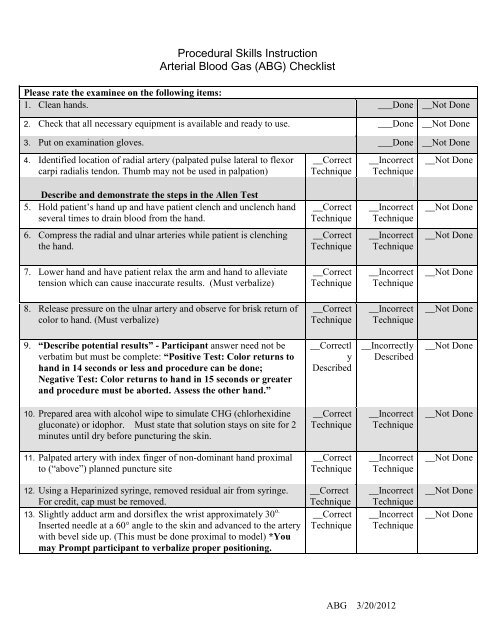
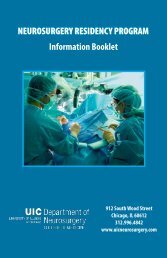
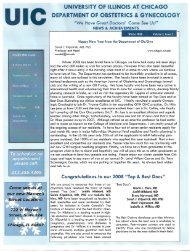
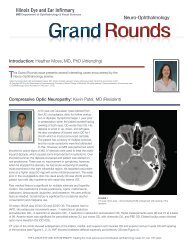
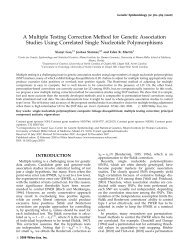
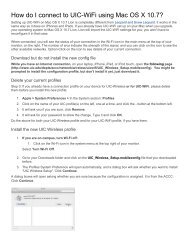
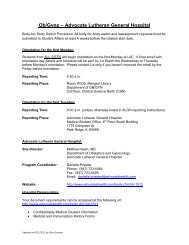
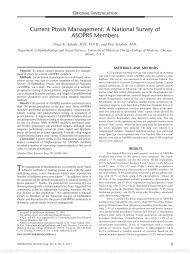
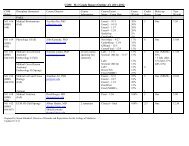
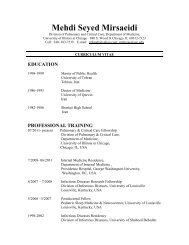
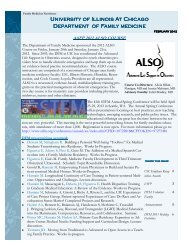
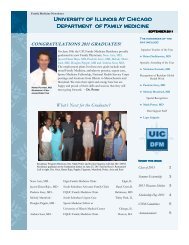
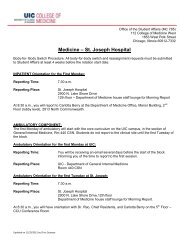
![CV Joan [W51] - University of Illinois College of Medicine at Chicago ...](https://img.yumpu.com/17336863/1/190x245/cv-joan-w51-university-of-illinois-college-of-medicine-at-chicago-.jpg?quality=85)
